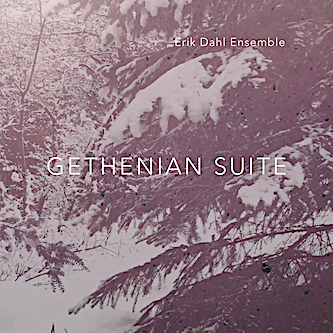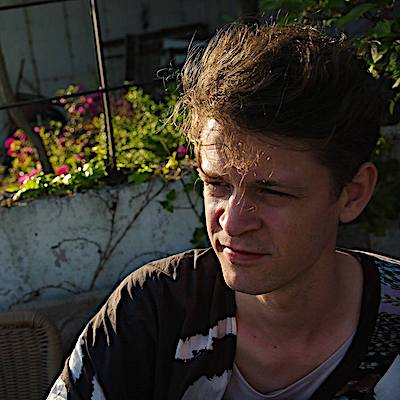|
|
||||
 
|
||||
|
|
ERIK DAHL ENSEMBLE |
|||
|
mwe3.com presents an interview with
Erik Dahl: I'm from Lund in the south of Sweden. Today I live in Göteborg which is the second largest city. The atmosphere is relaxed and the music scene is quite vibrant for a city of it's size. Well, it was at least. Currently there are no concerts. Restrictions have hit hard on cultural events. Hopefully culture will rise from the ashes when the pandemic is over. mwe3: What is your musical background and what period of music history did you grow up with, for example: during the 1960s, ‘70s, ‘80s what music had the most influence on you in your formative years? Erik Dahl: I grew up in the '80s and '90s. The public music school, which is government funded and has had a huge impact on the Swedish music scene, gave me a foundation in classical and jazz. I listened to punk, grunge, then jazz, Hip-Hop, Swedish indie, classical, electronica. In High School I was fascinated by early 20th century composers like Carl Nielsen and Benjamin Britten who wrote melodic stuff with weird harmonies. I still draw a lot of inspiration from all these sources. mwe3: How many albums have you recorded as a solo artist and with the Erik Dahl Ensemble and what other side projects do you record with, for example “Dream Pilot” and the music you’ve done with I Underlandet and how has your music progressed or changed since you started writing and recording your music? Is there a link in your musical output and do you also work with Theater music and other choreographers as well? How important is theater music in Sweden today? Erik Dahl: Gethenian Suite is the first album with the Ensemble and the first under my own name. I have been moving towards including more of myself. I'm trying to merge the many influences into a somewhat cohesive sound. It is an ongoing exploration. I like the sound and way the music is heading and I'm writing new music. The two albums with I Underlandet are more based around Swedish folk music, although far from traditional. I would say the melodic composition is a link. I have been writing for Theatre and Dance since 2007. No, I wouldn't say it is considered important. But it is a powerful medium, when you use music to its full potential it can really elevate a work for the stage.
Erik Dahl: There is a diverse and rich music scene in Sweden today with many many groups of high quality. A lot of the energy and creativity comes from musicians who run their own labels and organize concerts and small festivals themselves. mwe3: On your web site you mention influences such as Charles Mingus, Ennio Morricone, John Zorn, Jane Ira Bloom, Benjamin Britten, and Björk. Would you say jazz or classical or rock or avant-garde music has / had the biggest influence on you? Morricone is interesting in that he kind of paved the way for the fabled Spaghetti Western soundtracks plus he also influenced surf-rock instrumental bands too. Erik Dahl: I think all the artists mentioned combine many different elements in their music. I have listened extensively to Charles Mingus. And I'm inspired by how he used composition and form in an improvising context, and the wonderful quirky melodies. Morricone is really diverse. I especially like the 1960s and '70s soundtracks with harpsichord, organ, electric guitar, trumpet, voice, drum-set in odd combinations. I think everyone around me has been influenced by Björk. She has had a huge impact. From her I soak up everything from melodies to arrangement ideas. Favorite works of Britten include “Peter Grimes”, “A Midsummer Night's Dream” and “War Requiem”. Lots and lots of wonderful magical detail. mwe3: What are your live concerts like? You say, for instance, that you can perform Gethenian Suite with less than six musicians. Do your live concerts feature the Septet or a variation depending on the musicians on hand for the show and do you play mostly acoustic piano or with some electronica? Also tell us how you assembled the ensemble. Erik Dahl: For the full experience of the music we perform with all six musicians. When possible we also show projections along with the music. These are quite abstract. The visual element I feel brings out the texture in the music. We have also played in some smaller spaces, libraries. Out of necessity we have played in smaller constellations. It has been interesting though, giving different flavors. More of a chamber feel without drums and bass and slightly jazzier with just piano, clarinet and drums. There were some specific ideas behind putting the group together. I wanted to move in and out of different genres. After some thinking I decided on the combination of violin, clarinet and saxophone. I really love it, very colorful and versatile. I also chose the musicians because I really like them and wanted to play with them.
Erik Dahl: Yes, I used the book for inspiration in various ways. I've tried to convey it's different moods. The music also follows the dramaturgy of the book which culminates in an epic trek across a glacier. It was interesting for me to use something extra-musical to shape the piece. I love the book and it was fulfilling to have such a rich source of inspiration. I think it's very possible to appreciate the music without having read the book. But of course for those who have read it there can be some interesting interplay between the music and the words. mwe3: Can you tell us something about your keyboards and what gear you like the best? What pianos are you playing on Gethenian Suite and how about electronic keyboards, synths, mellotrons and do you also use sampling and loops for added effects? Erik Dahl: I play mainly piano in the group. There is a wonderful Fazioli grand piano in the studio we recorded in. I have a collection of tuned bells which can be heard as well. I do use sampling and live processing of audio quite a lot. I play in an improvisation duo called Levure Sauvage where this is central to the sound. On “The Ice” I recorded a loop of the violin, clarinet and saxophone which is then filtered and distorted. The sound somewhat resemble a snowstorm. I think it's beautiful to mix the acoustic instruments with electronically processed sound. There will be more of that in the future. mwe3: What has been the reaction so far to Gethenian Suite in Sweden and outside of Sweden? Can you tell us about some of your other projects, ongoing or about to start in 2021? What are you looking forward to as far as writing new music and also recording new music and other things planned for 2021 and even beyond?
Erik Dahl Ensemble:
|
|
|||
|
||||

 In that special place where jazz and classical music come together as one is where you will find Swedish composer / keyboardist Erik Dahl. Released in 2020, the 13-track, 61 minute Gethenian Suite takes the listener on a most incredible sonic journey that sounds inspired by new form of modern era Gothic Chamber music. Credited to The Erik Dahl Ensemble, Gethenian Suite is also influenced by melodic Swedish film soundtracks yet its core is very much centered around avant-garde classical music. Inspired by science fiction writer Ursula Le Guin, Gethenian Suite features a number of musicians backing Erik’s piano and electronics, including Anna Cochrane (viola / violin), Andreas Thurfjell (sax), Anna Malmström (clarinet) as well as Tove Brandt (double bass) and William Soovik (drums, percussion). Sweden has a long history of merging avant-garde music in the context of rock, jazz as well as classical. For a good example of Erik’s interesting sonic merger, give a listen to track 10, the 11-minute “The Ice”, which combines the three genres with ease. With the release of Gethenian Suite, Erik Dahl has mapped out a most intriguing musical terrain that is well worth exploring.
In that special place where jazz and classical music come together as one is where you will find Swedish composer / keyboardist Erik Dahl. Released in 2020, the 13-track, 61 minute Gethenian Suite takes the listener on a most incredible sonic journey that sounds inspired by new form of modern era Gothic Chamber music. Credited to The Erik Dahl Ensemble, Gethenian Suite is also influenced by melodic Swedish film soundtracks yet its core is very much centered around avant-garde classical music. Inspired by science fiction writer Ursula Le Guin, Gethenian Suite features a number of musicians backing Erik’s piano and electronics, including Anna Cochrane (viola / violin), Andreas Thurfjell (sax), Anna Malmström (clarinet) as well as Tove Brandt (double bass) and William Soovik (drums, percussion). Sweden has a long history of merging avant-garde music in the context of rock, jazz as well as classical. For a good example of Erik’s interesting sonic merger, give a listen to track 10, the 11-minute “The Ice”, which combines the three genres with ease. With the release of Gethenian Suite, Erik Dahl has mapped out a most intriguing musical terrain that is well worth exploring. 
 mwe3: Tell us something about the modern day world of Swedish music.
mwe3: Tell us something about the modern day world of Swedish music. mwe3: How is Gethenian Suite influenced by The Left Hand Of Darkness, written by author Ursula Le Guin in 1969 and how would you describe the impact of the book on you as you began to write music for Gethenian Suite? What are some of the key points you received from her book and is there a moral to the tale?
mwe3: How is Gethenian Suite influenced by The Left Hand Of Darkness, written by author Ursula Le Guin in 1969 and how would you describe the impact of the book on you as you began to write music for Gethenian Suite? What are some of the key points you received from her book and is there a moral to the tale? 